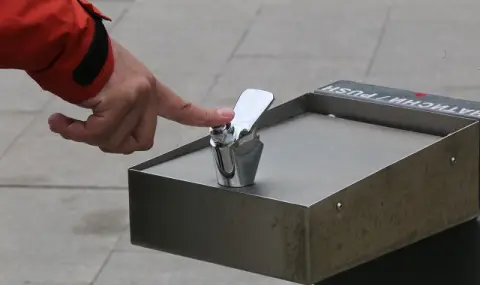Climate disasters, cybercrime or armed conflict: the EU wants individual member states to be better prepared for crises. The message is: "Prepare, but don't panic".
Do you have enough supplies for at least 72 hours in case of an emergency? Food, water, cash, medicine, identity documents, lighting and a radio that can receive long-wave signals are just some of the things that should be included in the list of survival supplies, according to the European Union.
The European Commission (EC) has asked national governments to introduce measures to ensure that citizens and public institutions such as schools and hospitals are better prepared to deal with possible future crises - from forest fires to industrial accidents to armed conflicts.
The new strategy comes after an EU-commissioned study last year found gaps in countries' preparedness to respond to disasters, as well as very different approaches in individual member states. Brussels now wants to harmonise measures and incentivise individual countries to be more active.
"You need to know what to do if the power goes out, if there is an earthquake, a major flood or any kind of threat. You need to know how to protect yourself, what resources you need and how to take responsibility yourself" - announced the responsible European Commissioner Roxana Manzato to reporters in Brussels.
What does the EU preparedness plan include?
The plan suggests that national authorities introduce or strengthen warning systems, adapt school curricula and roll out training programs to raise citizens' awareness of the risks they face.
The EU also plans to open a new centralised "crisis coordination centre" and increase existing EU common stocks of goods such as vaccines, transport equipment and critical equipment to counter chemical, biological, radiological and nuclear threats. It recommends that crisis preparedness be taught in schools and that regular exercises involving the armed forces, civil protection, police, firefighters and healthcare workers be held. The EC proposes to facilitate public procurement procedures for dual-use projects (civilian and military). It is planned that private business will prepare to ensure the uninterrupted operation of production lines in the event of a crisis.
Many of the proposed measures remain within the competence of national governments, which means that it is up to them alone whether they will implement Brussels' recommendations.
Some countries are better prepared than others
According to the EU executive, improving preparedness will involve different actions in different countries. For example, forest fires are more common in Spain and Greece, while earthquakes are more likely in Romania and Bulgaria.
"Each EU country must assess for itself what actions are necessary to protect citizens," said EU Commissioner Haja Labib, who is responsible for crisis preparedness. Germany has already published a 68-page document detailing what civilians should do in the event of floods, fires or nuclear accidents. The document includes recommendations for stockpiling food and other essential supplies for 10 days.
Finland, which shares a 1,300-kilometer border with Russia, is often cited as a model for emergency preparedness. For example, the country maintains underground shelters in case of bombing or nuclear threats and has a national emergency supply agency that is responsible for securing critical goods in the event of a crisis.
Rising risks
According to EU officials, threats to the community are increasing, and geopolitical tensions - such as Russia's war in Ukraine - have brought security to the forefront of the minds of more and more European citizens. "I wouldn't say we are directly threatened by a military attack, but we consider Russia a much more concrete threat than before", Emma Hakala of the Finnish Institute of International Affairs told DW.
"Most countries in Europe today also recognize the risks related to climate", she added. And hybrid threats should not be underestimated either - for example, cyberattacks on hospitals that can paralyze public health infrastructure. They are also becoming "more recognizable and more concrete", the Finnish representative added.
Prepare, but don't panic
In response to criticism that the EU was instilling fear in people, European Commissioner Haja Labib said: "Awareness of risks and preparation for them is the opposite of creating panic and irrational actions, as we may have seen during the Covid pandemic. Remember, we saw people crowding into stores, buying up toilet paper. Would that really protect them from the pandemic? No. Being prepared means knowing what could happen and being ready for it."
And Emma Hakala believes that it is good for citizens to be aware of potential threats and prepare for them. "But at the same time, it is not good for people to be too afraid of everything. Especially in this day and age, when there is so much opportunity for misinformation on social media."
The expert also warns against jumping to conclusions that incidents like fires or equipment failures could be sabotage. "In fact, it could be just an accident or something completely normal," she emphasizes.
